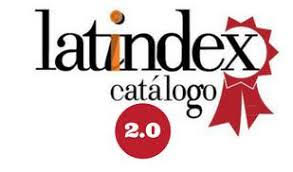Qualitative analysis of the social sustainability of urban drainage systems in Chile
DOI:
https://doi.org/10.22320/07190700.2022.12.01.03Keywords:
qualitative analysis, urban development, sustainable development, ChileAbstract
Moving towards sustainable urban development leads to applying new forms of drainage, which provide multiple technical and social benefits to the community. However, in countries like Chile, there is still a large gap regarding methodologies to assess the social sustainability of projects in this area. Using a qualitative content analysis applied to experts’ interviews (n = 11), this study aims at (1) identifying metrics to assess the social sustainability of urban drainage systems; (2) identifying challenges for the implementation of such metrics, and (3) proposing changes to the current system, to assess urban drainage systems that enhance the integration of social sustainability within these systems. The results show that experts proposed metrics that may assess social sustainability, but in practice, these metrics are difficult to quantify. In terms of challenges, the fragmentation of responsibilities from organizations that are involved in managing urban drainage systems may complicate the use of new social sustainability metrics. Ultimately, it is suggested that an institution is created that can manage urban drainage systems using an integrative approach, to account for the benefits of social sustainability of urban drainage systems. These results can be used by authorities and decision-makers who work with urban drainage systems, to move towards methodologies that consider the benefits of social sustainability.
Downloads
References
ANTHUN, K. S., MAASS, R. E. K., HOPE, S., ESPNES, G. A., BELL, R., KHAN, M. y LILLEFJELL, M. (2019). Addressing inequity: Evaluation of an intervention to improve accessibility and quality of a green space. International journal of environmental research and public health, 16(24). DOI: https://doi.org/10.3390/ijerph16245015
ARAYA, F., FAUST, K. M. y KAMINSKY, J. A. (2020). A decision-making framework for participatory planning: Providing water infrastructure services to displaced persons. En Construction Research Congress 2020: Infrastructure Systems and Sustainability (pp. 654-664). Reston, VA: American Society of Civil Engineers. DOI: https://doi.org/10.1061/9780784482858.071
ARAYA, F. y VÁSQUEZ, S. (2022). Challenges, drivers, and benefits to integrated infrastructure management of water, wastewater, stormwater and transportation systems. Sustainable Cities and Society, 82. DOI: https://doi.org/10.1016/j.scs.2022.103913
ASHLEY, R. M., GERSONIUS, B., DIGMAN, C., HORTON, B., BACCHIN, T., SMITH, B., SHAFFER, P. y BAYLIS, A. (2018). Demonstrating and Monetizing the Multiple Benefits from Using SuDS. Journal of Sustainable Water in the Built Environment, 4(2). DOI: https://doi.org/10.1061/JSWBAY.0000848
ATANDA, J. O. (2019). Developing a social sustainability assessment framework. Sustainable Cities and Society, 44, 237-252. DOI: https://doi.org/10.1016/j.scs.2018.09.023
AXELSSON, R., ANGELSTAM, P., DEGERMAN, E., TEITELBAUM, S., ANDERSSON, K., ELBAKIDZE, M. y DROTZ, M. K. (2013). Social and cultural sustainability: Criteria, indicators, verifier variables for measurement and maps for visualization to support planning. Ambio, 42(2), 215-228. DOI: https://doi.org/10.1007/s13280-012-0376-0
BRUNDTLAND, G. H. (1987). Our common future—Call for action. Environmental Conservation, 14(4), 291-294. DOI: https://doi.org/10.1017/S0376892900016805
CHINI, C., CANNING, J., SCHREIBER, K., PESCHEL, J. y STILLWELL, A. (2017). The Green Experiment: Cities, Green Stormwater Infrastructure, and Sustainability. Sustainability, 9(1). DOI: https://doi.org/10.3390/su9010105
CHINYIO, E. y OLOMOLAIYE, P. (2009). Construction stakeholder management. Oxford: John Wiley & Sons.
EIZENBERG, E. y JABAREEN, Y. (2017). Social sustainability: A new conceptual framework. Sustainability, 9(1). DOI: https://doi.org/10.3390/su9010068
EL HATTAB, M. H., THEODOROPOULOS, G., RONG, X. y MIJIC, A. (2020). Applying the systems approach to decompose the SuDS decision-making process for appropriate hydrologic model selection. Water, 12(3). DOI: https://doi.org/10.3390/w12030632
FAJARDO, R. J., VALDELAMAR, J. C. y MOUTHON, J. (2019). A rain garden for nitrogen removal from storm runoff in tropical cities. Revista de Ciencias Ambientales, 53(2), 132-146. DOI: http://dx.doi.org/10.15359/rca.53-2.7
FERRANS, P., TORRES, M. N., TEMPRANO, J. y SÁNCHEZ, J. P. R. (2022). Sustainable urban drainage system (SUDS) modeling supporting decision-making: a systematic quantitative review. Science of the Total Environment, 806. DOI: https://doi.org/10.1016/j.scitotenv.2021.150447
GALVIN, R. (2015). How many interviews are enough? Do qualitative interviews in building energy consumption research produce reliable knowledge? Journal of Building Engineering, 1, 2-12. DOI: http://dx.doi.org/10.1016/j.jobe.2014.12.001
GIMENEZ, M., BREUSTE, J. y HOF, A. (2020). Sustainable Drainage Systems for transitioning to sustainable urban flood management in the European Union: A review. Journal of Cleaner Production, 255. DOI: https://doi.org/10.1016/j.jclepro.2020.120191
GOGATE, N. G., KALBAR, P. P. y RAVAL, P. M. (2017). Assessment of stormwater management options in urban contexts using Multiple Attribute Decision-Making. Journal of cleaner production, 142, 2046-2059. DOI: https://doi.org/10.1016/j.jclepro.2016.11.079
HACKER, M. E., KAMINSKY, J., FAUST, K. M. y RAUCH, S. (2020). Regulatory Enforcement Approaches for Mass Population Displacement. Journal of Construction Engineering and Management, 146(5). Recuperado de https://ascelibrary.org/doi/abs/10.1061/%28ASCE%29CO.1943-7862.0001820
HERNÁNDEZ, R., FERNÁNDEZ, C. y BATIPSTA, P. (2014). Metodología de la Investigación (6th ed.). México, DF: McGraw-Hill Interamericana.
Instituto Nacional de Estadísticas [INE] (2018). Mejor acceso a servicios y equipamientos públicos básicos. Recuperado de https://insights.arcgis.com/#/embed/017b497bed394412a8def49f7a95a808
Instituto Nacional de Estadísticas [INE] (27 de agosto de 2019). Entre 2002 y 2017 las áreas urbanas del país crecieron un tamaño equivalente al Gran Santiago. Recuperado de https://www.ine.cl/prensa/2019/09/16/entre-2002-y-2017-las-%C3%A1reas-urbanas-del-pa%C3%ADs-crecieron-un-tama%C3%B1o-equivalente-al-gran-santiago
JARVIE, J., ARTHUR, S. y BEEVERS, L. (2017). Valuing Multiple Benefits and the Public Perception of SUDS Ponds. Water, 9(2), 128. DOI: https://doi.org/10.3390/w9020128
JATO-ESPINO, D., TORO-HUERTAS, E. I. y GÜERECA, L. P. (2022). Lifecycle sustainability assessment for the comparison of traditional and sustainable drainage systems. Science of The Total Environment, 817. DOI: https://doi.org/10.1016/j.scitotenv.2022.152959
JIANG, C., LI, J., LI, H., LI, Y. y ZHANG, Z. (2020). Low-impact development facilities for stormwater runoff treatment: Field monitoring and assessment in Xi’an area, China. Journal of Hydrology, 585. DOI: https://doi.org/10.1016/j.jhydrol.2020.124803
JIMÉNEZ ARIZA, S. L., MARTÍNEZ, J. A., MUÑOZ, A. F., QUIJANO, J. P., RODRÍGUEZ, J. P., CAMACHO, L. A. y DÍAZ-GRANADOS, M. (2019). A multicriteria planning framework to locate and select sustainable urban drainage systems (SUDS) in consolidated urban areas. Sustainability, 11(8). DOI: https://doi.org/10.3390/su11082312
JOHNSON, D. y GEISENDORF, S. (2019). Are Neighborhood-level SUDS Worth it? An Assessment of the Economic Value of Sustainable Urban Drainage System Scenarios Using Cost-Benefit Analyses. Ecological Economics, 158, 194-205. DOI: https://doi.org/10.1016/j.ecolecon.2018.12.024
JOSE, R., WADE, R. y JEFFERIES, C. (2015). Smart SUDS: Recognising the multiple-benefit potential of sustainable surface water management systems. Water Science and Technology, 71(2), 245-251. DOI: https://doi.org/10.2166/wst.2014.484
LAMI, I. M. y MECCA, B. (2021). Assessing social sustainability for achieving sustainable architecture. Sustainability, 13(1). DOI: https://doi.org/10.3390/su13010142
Ley N° 19.525 (1997). Regula sistemas de evacuación y drenaje de aguas lluvias. D.O. 24.10.1997. Recuperado de http://bcn.cl/2et48
NAMEY, E., GUEST, G., THAIRU, L. y JOHNSON, L. (2008). Data reduction techniques for large qualitative data sets. Handbook for team-based qualitative research, 2(1), 137-161.
Ministerio de Desarrollo Social y Familia [MIDESO] (2017). Metodología Formulación y Evaluación de Proyectos de Evacuación y Drenaje de Aguas Lluvias. Recuperado de http://sni.gob.cl/storage/docs/metodolog%C3%ADa%20aguas%20lluvias%20%2029-11-2017%20final.pdf
Ministerio de Obras Públicas [MOP] (2013). Manual de Drenaje Urbano. Recuperado de http://hdl.handle.net/20.500.12140/25907
OLAWUMI, T. O. y CHAN, D. W. (2018). A scientometric review of global research on sustainability and sustainable development. Journal of cleaner production, 183, 231-250. DOI: https://doi.org/10.1016/j.jclepro.2018.02.162
Patagua, Fundación Legado Chile y Pontifica Universidad Católica de Chile (2021). Ciudades sensibles al agua. Guía de drenaje Urbano Sostenible para la Macrozona Sur de Chile. Santiago: Patagua, Fundación Legado Chile y Pontificia Universidad Católica de Chile. Recuperado de https://www.cedeus.cl/wp-content/uploads/2021/05/Guia-DUS_VOL-II-2.pdf
SALDAÑA, J. (2013). The Coding Manual for Qualitative Researchers. London: SAGE Publications Ltd.
SHEN, L.Y., OCHOA, J., SHAH, M. N. y ZHANG, X. (2011). The application of urban sustainability indicators – A comparison between various practices. Habitat International, 35(1), 17-29. DOI: https://doi.org/10.1016/j.habitatint.2010.03.006
SIERRA, L. A., PELLICER, E. y YEPES, V, (2017). Method for estimating the social sustainability of infrastructure projects. Environmental Impact Assessment Review, 65, 41-53. DOI: https://doi.org/10.1016/j.eiar.2017.02.004
SIERRA, L. A., YEPES, V. y PELLICER, E. (2018). A review of multi-criteria assessment of the social sustainability of infrastructures. Journal of Cleaner Production, 187, 496-513. DOI: https://doi.org/10.1016/j.jclepro.2018.03.022
URIBE, M. G., FAUST, K. M. y CHARNITSKI, J. (2019). Policy driven water sector and energy dependencies in Texas border colonias. Sustainable Cities and Society, 48. DOI: https://doi.org/10.1016/j.scs.2019.101568
VALDES-VASQUEZ, R. y KLOTZ, L. E. (2013). Social sustainability considerations during planning and design: Framework of processes for construction projects. Journal of construction engineering and management, 139(1), 80-89. DOI: https://doi.org/10.1061/(ASCE)CO.1943-7862.0000566
VALLANCE, S., PERKINS, H. C. y DIXON, J. E. (2011). What is social sustainability? A clarification of concepts. Geoforum, 42(3), 342-348. https://doi.org/10.1016/j.geoforum.2011.01.002
VILLALBA, G. A., CURTO, F. A., MALEGNI, N. J. y LINFANTE, A. F. (2019). Sistemas Urbanos de Drenaje Sostenible como herramienta para resolver problemas de inundaciones urbanas. Experiencias en Costa Esmeralda. Aqua-LAC, 11(2), 39-49. DOI: https://doi.org/10.29104/phi-aqualac/2019-v11-2-04
WOODS-BALLARD, B., KELLAGHER, R., MARTIN, P., JEFFERIES, C., BRAY, R. y SHAFFER, P. (2007). The SUDS manual (Vol. 697). London: Ciria.
Downloads
Published
How to Cite
Issue
Section
License
Copyright (c) 2022 Gianina Hidalgo-Monroy , Sebastian Vasquez-Avila , Felipe Araya

This work is licensed under a Creative Commons Attribution-ShareAlike 4.0 International License.
The content of articles which are published in each edition of Habitat Sustentable, is the exclusive responsibility of the author(s) and does not necessarily represent the thinking or compromise the opinion of University of the Bio-Bio.
The author(s) conserve their copyright and guarantee to the journal, the right of first publication of their work. This will simultaneously be subject to the Creative Commons Recognition License CC BY-SA, which allows others to share-copy, transform or create new materials from this work for non-commercial purposes, as long as they recognize authorship and the first publication in this journal, and its new creations are under a license with the same terms.

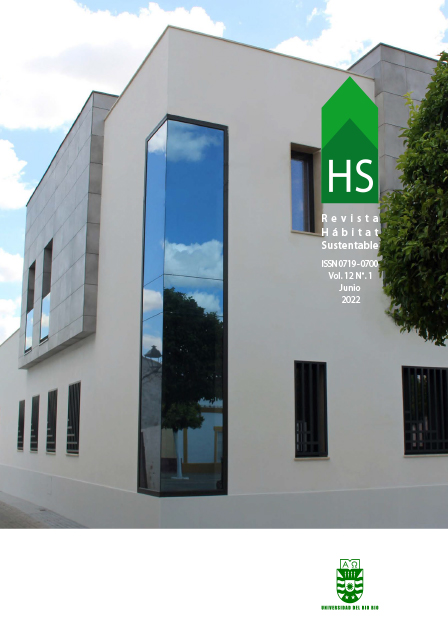
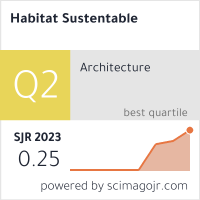






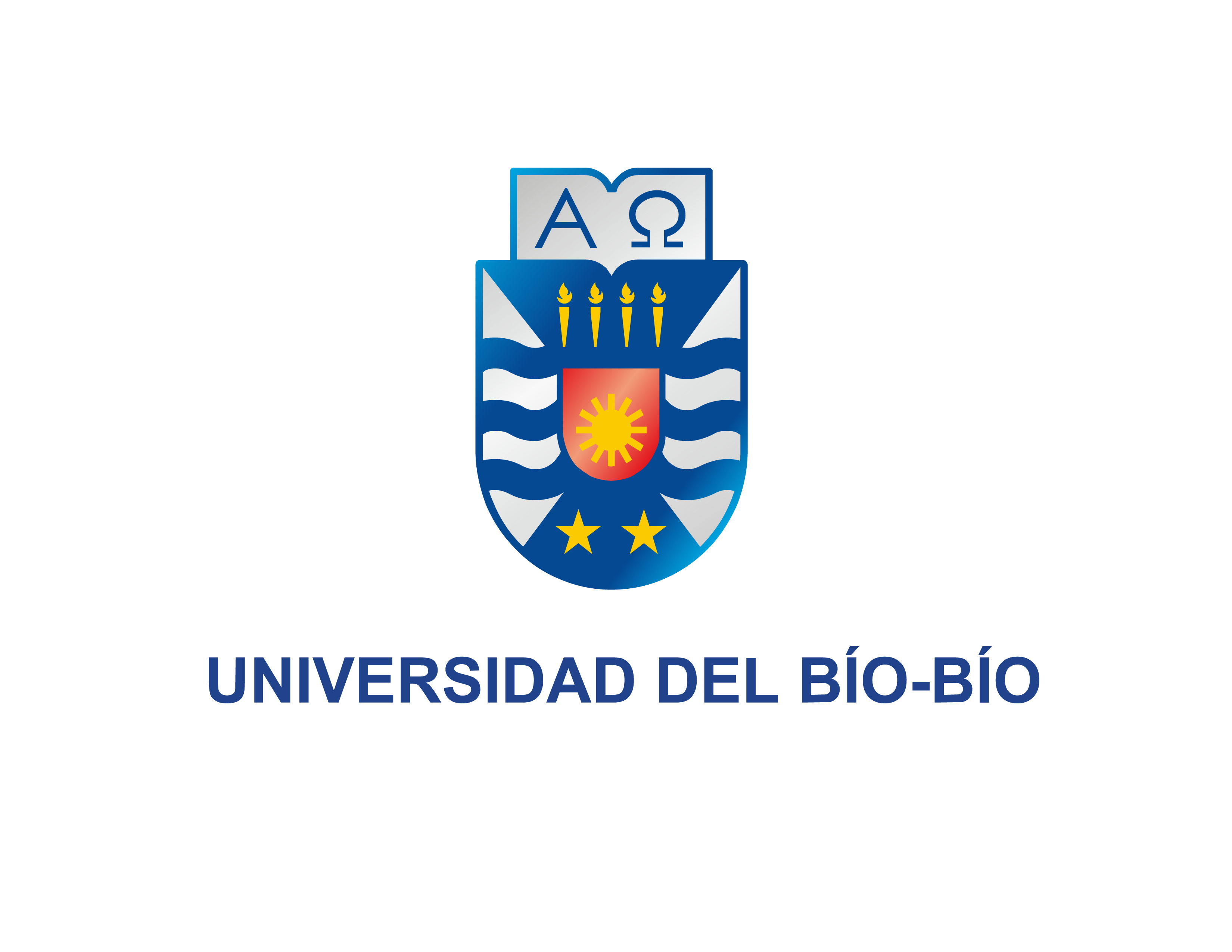

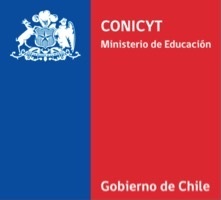 Scientific Information Program/Concurso Fondos de Publicación de Revistas Científicas 2018/ Proyecto Mejoramiento de Visibilidad de Revistas UBB (Código:FP180007).
Scientific Information Program/Concurso Fondos de Publicación de Revistas Científicas 2018/ Proyecto Mejoramiento de Visibilidad de Revistas UBB (Código:FP180007).
